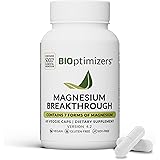BIOptimizers Magnesium Breakthrough Supplement with 500mg - 7 Forms of Magnesium: Glycinate, Malate, Citrate, and More - Natural Support for Sleep and Cognitive Function -60 Capsules- Calming Vitamins
$39.95 (as of February 21, 2026 22:27 GMT +00:00 - More infoProduct prices and availability are accurate as of the date/time indicated and are subject to change. Any price and availability information displayed on [relevant Amazon Site(s), as applicable] at the time of purchase will apply to the purchase of this product.)Omega‑3 Buying Guide: EPA & DHA Basics, Quality Checks, and When Supplements Are Used
Omega‑3 fats are essential nutrients. Many people aim to eat fatty fish twice weekly, but if your intake is low, a fish oil or algal oil supplement may be considered with your clinician’s guidance. This guide explains which forms to look for, how much EPA/DHA is in a serving, and simple quality checks so you can choose confidently.
What to Know (EPA, DHA, and ALA)
EPA and DHA are the marine omega‑3s found in fish and algae; ALA comes from plants like flax and walnuts. Your body converts only a small fraction of ALA into EPA/DHA, so labels listing “omega‑3s” from plant oils are not the same as EPA/DHA content. Health organizations note that people with established coronary heart disease are often advised to get about ~1 g/day EPA+DHA, ideally from fish, with supplements considered under medical guidance. For people without high cardiovascular risk, food-first remains the default approach.
How to Choose (Dose, Form, Purity)
Flip the bottle to find the per‑serving amounts of EPA and DHA (not just “fish oil”). Typical general‑wellness products provide ~250–500 mg EPA+DHA per serving; higher‑dose products exist for specific clinical uses under supervision. You’ll see “triglyceride,” “re‑esterified triglyceride,” or “ethyl ester” forms—absorption can vary, but real‑world differences are often smaller than basics like taking with meals. Look for third‑party testing (e.g., IFOS/NSF/USP), clear oxidation controls (low TOTOX), and species transparency. For vegetarians, algal oil provides DHA (often with some EPA).
Use & Safety
Take with food to reduce aftertaste. Potential adverse effects include digestive upset and fishy burps; high doses can affect bleeding risk or interact with medications. People with fish/shellfish allergy should choose algal oil. As always, discuss with your healthcare professional before starting any supplement, especially if you’re pregnant, have a bleeding disorder, take anticoagulants, or were advised to use prescription omega‑3s.
Disclaimer: Educational only; not medical advice. Always consult your clinician for personalized recommendations.
References
- NIH Office of Dietary Supplements. Omega‑3 Fatty Acids — Health Professional Fact Sheet.
- American Heart Association. Are you getting enough omega‑3 fatty acids?.
Accessed 2025-07-30.



